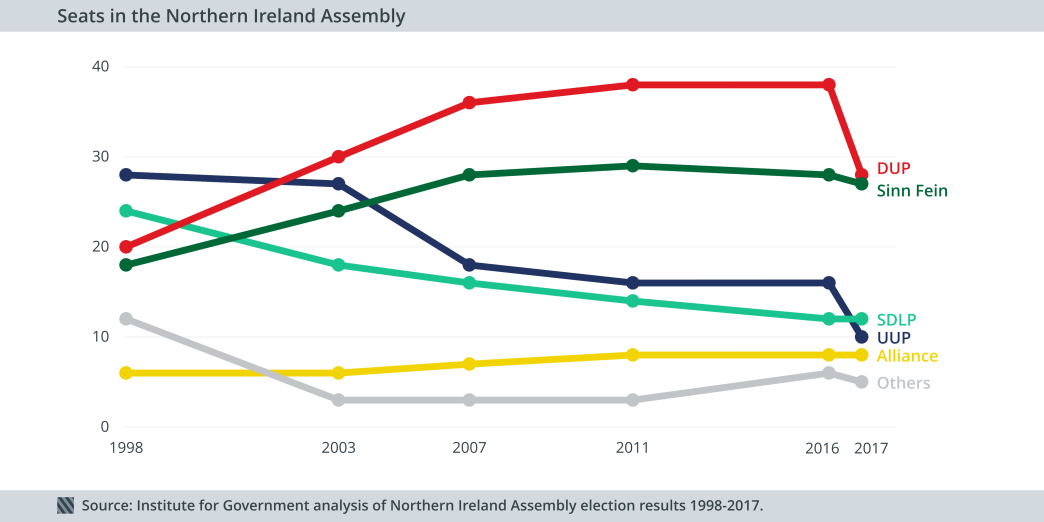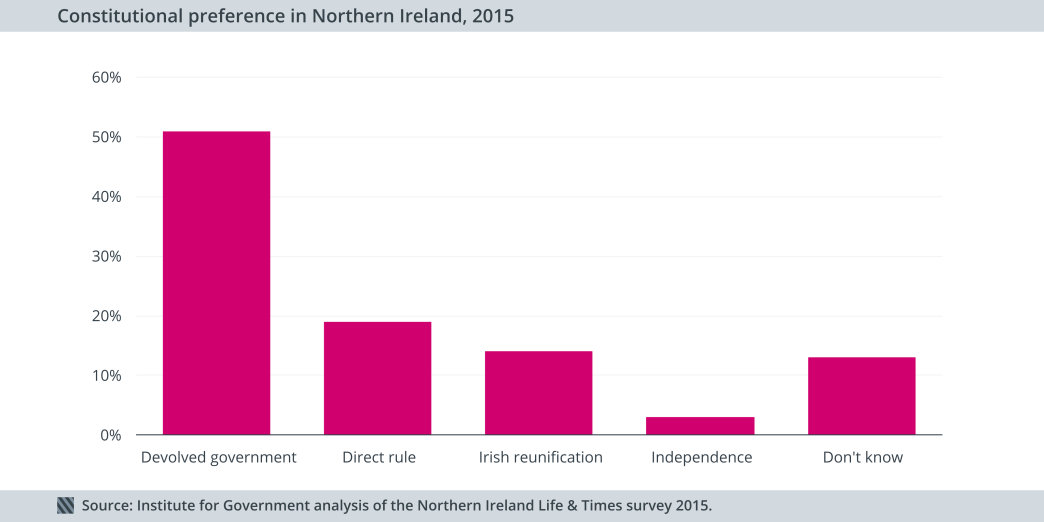As negotiations on establishing a devolved government in Northern Ireland continue, the deadline for a deal inches ever closer. Aron Cheung says Northern Ireland could head back to the polls if no agreement is reached by Monday.
Headlines in Northern Ireland and beyond have been dominated this week by the death of former Deputy First Minister Martin McGuinness. But important negotiations regarding the future of devolved government in the region continue, with the Democratic Unionist Party (DUP) and Sinn Féin yet to reach a power-sharing agreement that will allow a government to be formed following the recent election. There are now only four days left for a deal to be reached, and the likelihood of the Monday deadline passing without an agreement is growing.
The election was the result of a breakdown in relations between the two main parties in the Assembly – the DUP and Sinn Féin, as the IfG explains it its pre-election briefing paper. The resignation of the late Martin McGuiness led to a stalemate in Stormont, and the Northern Ireland Secretary, James Brokenshire, was left with little choice but to call a new election.
A new election - third time lucky?
If the negotiation period ends without agreement on the appointment of a First and Deputy First Minister, the Northern Ireland Act 1998 states that “the Secretary of State shall propose a date for the poll for the election of the next Assembly”.
James Brokenshire has confirmed in a letter to Assembly members shortly after the election that this option is on the table if no quick agreement can be reached. However, the Secretary of State also expresses reservations about the “ongoing disruption and uncertainty for businesses and the people of Northern Ireland”.
If a fresh election is indeed called, it will be the third assembly election within 12 months. Given that the most recent vote has seemingly failed to resolve the disputes in Stormont, it is far from guaranteed that a new election would clear the roadblocks.

A deadline extension
An alternative option would be to extend the negotiating window available for the DUP and Sinn Féin to reach an agreement. Irish Prime Minister Enda Kenny suggests this could happen, as has former Northern Ireland Secretary Theresa Villiers who recommends that the current Secretary of State has legislation ready to enable an extension. The Government itself has not indicated whether it is preparing for this possibility.
Whether this approach is taken or not will largely depend on the extent to which there is a feeling that progress is being made in talks between the main parties. Ulster Unionist Party (UUP) chief negotiator Tom Elliot says that “while a deal is possible, the chances of one by Monday aren't great”. However, Sinn Féin leader Gerry Adams has rejected the prospect of an extension, saying that there “cannot be continuous negotiation… it is possible for agreement to be reached in the coming days”.
A return to direct rule
Fresh elections or extended negotiations may fail to resolve the disagreements in Stormont. It is therefore possible that Northern Ireland will return to direct rule from Westminster, despite James Brokenshire stating that he is “not contemplating any other outcome but a resumption of devolved government as soon as possible”.
While Enda Kenny claims that he has received reassurances from Theresa May that there will be no return to direct rule, this has been rebuffed by unionist politicians. Downing Street has also stressed that stability in Northern Ireland is "a UK responsibility".
Reunification with the Republic or a new settlement?
In principle, the other way out of the impasse would be for the north and south parts of Ireland to reunite. A border poll on reunification has been proposed by Sinn Féin since the vote for Brexit, while the smaller Social Democratic and Labour Party (SDLP) party suggests that London and Dublin could exercise ‘joint sovereignty’ over Northern Ireland. The Irish Prime Minister has also raised the possibility of moving towards reunification.

For the immediate future, the options for Northern Ireland are an unpopular third election, an unpopular reversion to direct rule, or somehow for the parties to bury their differences and work together again. We hope it’s the latter.
- Supporting document
- briefing-note-northern-ireland-elections v3.pdf (PDF, 600.25 KB)